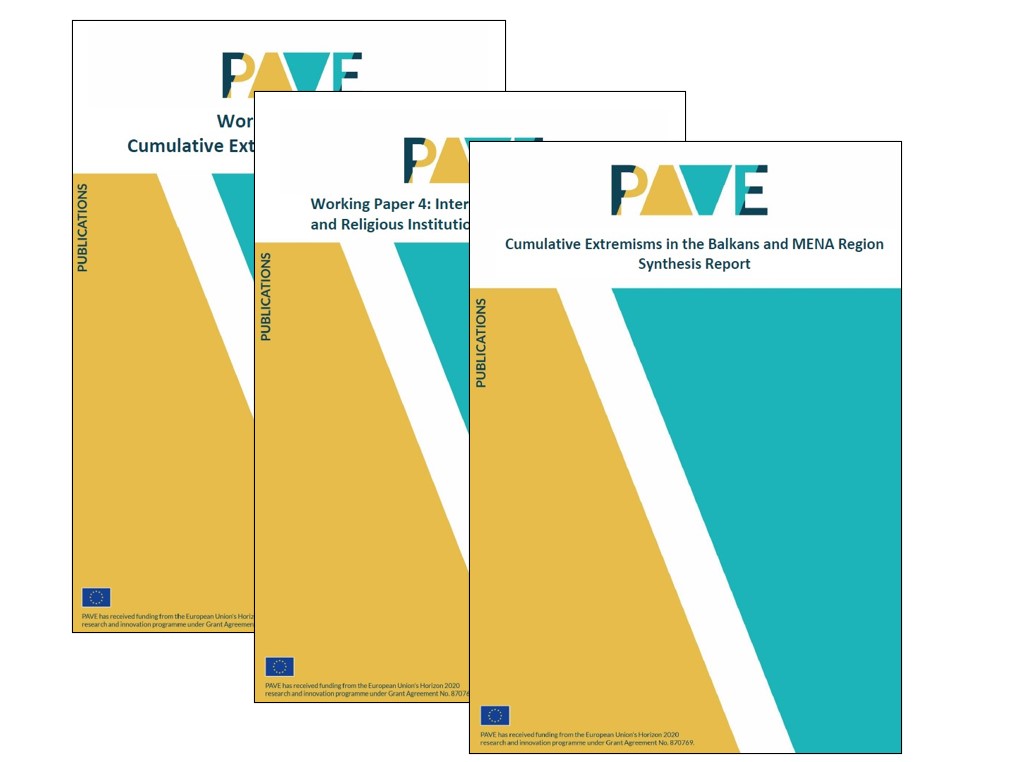Publication of PAVE research reports
The PAVE Consortium released its research reports on fieldwork results
The research reports on fieldwork results carried out by the PAVE consortium are now available online. Relating to the project’s work packages 3, 4 and 5, eight separate reports analyse the field research findings. Drawing comparisons between different field sites within one country, between countries, and finally between the Western Balkans and MENA regions, the reports are situated at different levels of comparative abstraction in order to extract the essence of the gathered data and identify relevant patterns of vulnerability and resilience to violent extremism that lend themselves to targeted policy and civil society interventions.  Centred on the three main thematic research areas of the PAVE project (WP3: cumulative extremisms, WP4: interactions between state and religious institutions, and WP5: online and offline dynamics), the reports contain dense and comprehensive information collected in 7 research countries: Bosnia and Herzegovina, Iraq, Kosovo, Lebanon, North Macedonia, Serbia and Tunisia. The research was conducted by 9 country-based research teams.
Centred on the three main thematic research areas of the PAVE project (WP3: cumulative extremisms, WP4: interactions between state and religious institutions, and WP5: online and offline dynamics), the reports contain dense and comprehensive information collected in 7 research countries: Bosnia and Herzegovina, Iraq, Kosovo, Lebanon, North Macedonia, Serbia and Tunisia. The research was conducted by 9 country-based research teams.
Let’s take a closer look at the content of the reports:
The working paper on cumulative extremisms in the Western Balkans compiles cross-country findings from Bosnia and Herzegovina, Serbia, North Macedonia and Kosovo. Here, “cumulative extremisms”, one of the core innovative theoretical concepts of the PAVE project is tested against the empirical reality in the Western Balkans, showing how the legacy of the wars of the 1990s materialises in widely institutionalised ethnic segregation. Incompatible narratives about the past manifest in polarisation of opinions, and antagonistic extremist ideologies that are fed by self-victimisation and othering. At the same time, prospects for resilience against radicalisation exist in the implementation of impactful CSO work, improved education and a positive role played by religious leaders.
Two working papers look separately at the interactions between religious and state institutions in the Western Balkans (Serbia and Bosnia and Herzegovina), as well as the MENA region (Tunisia, Lebanon and Iraq). At the same time as disentangling the complex institutional set-ups of all of these country cases, the reports find that cooperation between religious and political institutions, as well as the recognition of informal religious institutions as relevant actors for (de)radicalisation can contribute to vulnerability as well as resilience at the community level. In addition, the ethnically and sectarian set-up of the countries under study consistently contributed to the emergence of overlapping forms of extremisms in these societies.
Two further working papers investigate the dimensions of online and offline (de-)radicalisation dynamics in Kosovo and North Macedonia, in addition to comparing Tunisia and Lebanon. While no general comparability between patterns of online radicalisation as they are known to take place in countries in the Global North and our countries of study can be established, the reports are able to trace how the dissemination of extremist narratives flows between the online and offline sphere. Further, the reports identify for what purposes extremist organisations make use of social media channels.
The cross-country synthesis reports for work packages 3, 4 and 5 broaden the perspective of each of the thematic clusters by comparing findings from the Western Balkans and MENA region, hereby identifying cross-regional trends and differences.
The PAVE consortium is looking forward to present the main research findings and resulting policy recommendations at policy roundtables that will take place in the project countries in the autumn and winter of 2022.